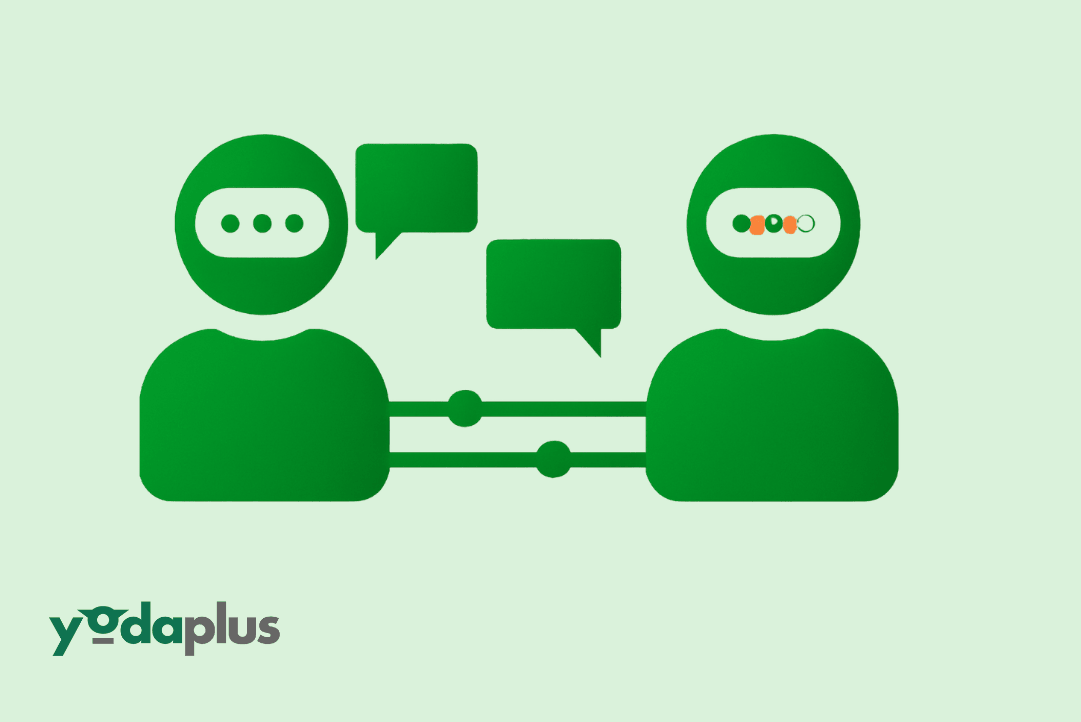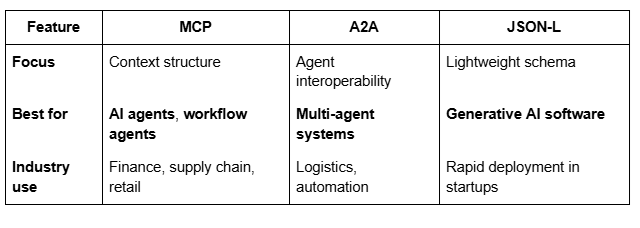
The Rise of Context Object Standards: MCP vs A2A vs JSON-L
September 22, 2025 By Yodaplus
Artificial Intelligence is evolving from simple automation into agentic AI systems that can collaborate, reason, and adapt. As AI agents grow more complex, the way they handle context—data about roles, memory, and workflows—becomes critical. Without clear standards, AI applications risk inconsistency, poor interoperability, and limited scalability.
This is why context object standards such as MCP, A2A, and JSON-L schemas are gaining importance. These approaches define how information flows across multi-agent systems, ensuring AI-powered automation is reliable and explainable.
Why Context Matters in Agentic AI
Every ai system relies on context to understand user intent, recall previous interactions, and adapt workflows. In agentic frameworks, context objects allow autonomous agents to communicate with one another and make decisions based on shared information.
-
For machine learning and deep learning models, context improves predictions.
-
For conversational AI and NLP, it makes interactions natural and useful.
-
For AI-driven analytics, context creates actionable insights that align with business goals.
The need for reliable AI highlights why a shared structure like context objects is not just technical—it is foundational for the future of AI.
MCP: A Step Toward Structured Context
The Model Context Protocol (MCP) is designed to standardize how LLM-based systems store and exchange context. It supports vector embeddings, semantic search, and integration with knowledge-based systems.
Key features of MCP:
-
Defines memory persistence for autonomous AI.
-
Enables role handoffs between workflow agents.
-
Supports AI applications in industries like supply chain, finance, and logistics.
Read more in our blog on What is MCP and Why It’s Critical.
MCP is already being tested in agentic AI platforms, making it a foundation for scalable artificial intelligence solutions.
A2A: Agent-to-Agent Protocol
A2A, or Agent-to-Agent communication, focuses on interoperability. Where MCP defines structured context, A2A ensures AI agents can directly share information across frameworks.
Benefits of A2A:
-
Improves collaboration in multi-agent systems.
-
Reduces friction between agent AI software and AI workflows.
-
Aligns with responsible AI practices by increasing transparency.
This standard matters for AI in logistics and AI in supply chain optimization, where agents must share operational data quickly and reliably.
JSON-L Schemas: Lightweight and Flexible
JSON-L schemas provide a simpler approach. They are designed for generative AI use cases, making it easy to structure and transmit context in familiar JSON format.
Advantages:
-
Easy adoption across gen AI tools.
-
Works with AI models and neural networks that require lightweight data.
-
Enables financial research tools, AI in business, and agentic AI solutions to plug into broader systems.
JSON-L is not as robust as MCP or A2A, but it provides flexibility for emerging markets analysis and scenario analysis where rapid integration is more important than long-term structure.
Comparing MCP, A2A, and JSON-L
The three standards are not competitors but complementary. Together, they create a future of AI where autonomous systems are explainable, scalable, and easy to integrate.
Why This Matters for Businesses
For businesses, context standards mean faster deployment of AI-powered automation and AI innovation without being locked into one vendor or framework.
-
In finance, they improve audit reports and AI-driven analytics for investment insights.
-
In logistics, they streamline AI in supply chain optimization and warehouse workflows.
-
In retail, they support AI agents that enhance customer engagement.
These standards also advance responsible AI practices by ensuring AI risk management, financial transparency, and explainable AI.
Conclusion
The rise of MCP, A2A, and JSON-L schemas shows how artificial intelligence technology is entering a new phase, where context is as important as models.
For agentic AI use cases, adopting context object standards will help companies create AI agent frameworks that are scalable, reliable, and future-ready. The next era of Artificial Intelligence in business will not be defined by individual AI agents, but by the standards that allow them to work together.
At Yodaplus Artificial Intelligence Solutions, we help enterprises embrace these evolving standards with tailored strategies that bring together generative AI, multi-agent systems, and AI-powered automation to unlock real business value.
